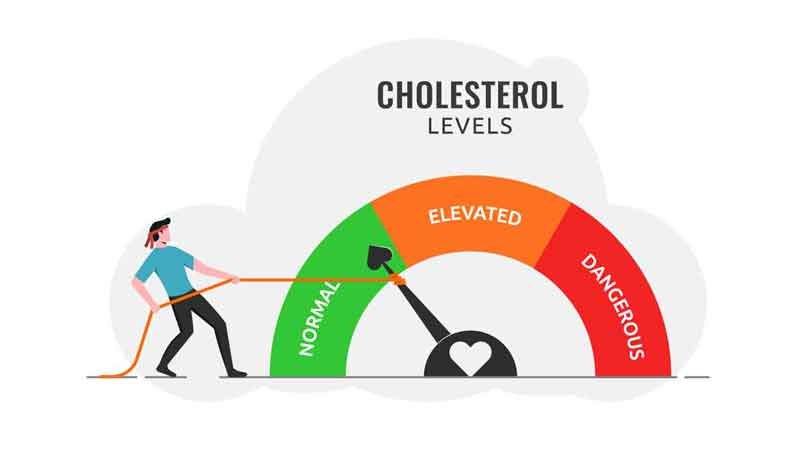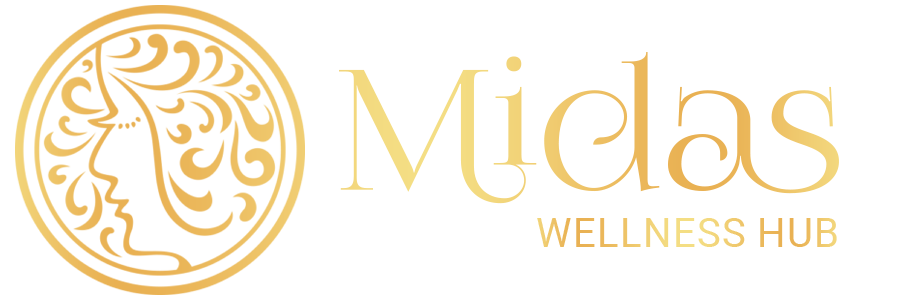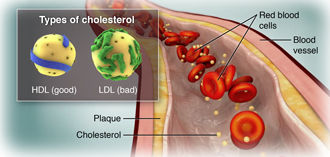
High Cholesterol Can Affect Your Whole Body: How Functional Medicine and Diet Play an Important Role

High Cholesterol Can Affect Your Whole Body: How Functional Medicine and Diet Play an Important Role
Cholesterol is often misunderstood. Many people associate it only with heart disease, but the truth is that high cholesterol affects your entire body, from your brain and liver to your hormones and overall energy levels.
At Midas Wellness Hub, we look at cholesterol through the lens of functional medicine, which means understanding why your cholesterol levels are high, not just how to lower them. By addressing the root cause through personalized nutrition, lifestyle changes, and holistic care, we help patients achieve lasting balance, naturally.
Let’s explore how cholesterol impacts your health and how functional medicine and diet can transform your well-being.
Understanding Cholesterol: The Good and the Bad
Cholesterol is a waxy, fat-like substance found in every cell of your body. It’s essential for producing hormones, vitamin D, and bile acids that help digest fats.
However, when cholesterol levels become imbalanced, it can lead to health complications.
There are two main types of cholesterol:
- LDL (Low-Density Lipoprotein): Often called “bad cholesterol,” high levels of LDL can lead to plaque buildup in arteries.
- HDL (High-Density Lipoprotein): Known as “good cholesterol,” HDL helps remove excess cholesterol from the bloodstream.
A healthy balance between LDL and HDL is crucial for overall health.
How High Cholesterol Affects Your Whole Body
While most people connect high cholesterol with heart problems, its impact goes far beyond the cardiovascular system.
1. Heart and Blood Vessels
Excess LDL cholesterol can accumulate in the arteries, forming plaque. Over time, this narrows the arteries and restricts blood flow, a condition known as atherosclerosis. This can lead to:
- Heart attack
- Stroke
- Hypertension
- Peripheral artery disease
2. Brain Health
The brain contains nearly 25% of the body’s cholesterol. When cholesterol levels are imbalanced, it can affect cognitive function, leading to:
- Memory loss
- Difficulty focusing
- Increased risk of dementia or Alzheimer’s disease
3. Liver Function
The liver plays a central role in cholesterol metabolism. When LDL levels rise, it puts extra strain on the liver, leading to fatty liver disease or liver inflammation.
4. Hormonal Imbalance
Cholesterol is the foundation for many hormones, including estrogen, testosterone, and cortisol. High or low cholesterol levels can disrupt hormone production, leading to:
- Fatigue
- Irregular menstrual cycles
- Low libido
- Mood swings
5. Digestive System
Bile, which helps break down fats, is made from cholesterol. When levels are imbalanced, it can cause digestion issues like bloating, indigestion, and poor fat absorption.
6. Skin and Hair
Poor circulation and reduced oxygen supply from cholesterol buildup can affect skin elasticity and hair growth, making you appear tired or aged prematurely.
In short, cholesterol imbalance doesn’t just affect your heart, it affects your entire system.
Why Traditional Treatment Isn’t Enough
Conventional medicine often focuses on medications like statins to lower cholesterol levels. While these drugs can reduce LDL cholesterol, they don’t always address the underlying cause, such as:
- Poor diet
- Chronic stress
- Inflammation
- Hormonal imbalance
- Gut dysfunction
Moreover, long-term use of cholesterol-lowering drugs may lead to side effects like muscle pain, fatigue, and liver strain.
This is where functional medicine offers a more sustainable, root-cause approach.
The Functional Medicine Approach at Midas Wellness Hub

At Midas Wellness Hub, we view high cholesterol as a symptom, not the disease itself. Our goal is to uncover why your cholesterol is high and create a plan that supports your body’s natural ability to heal and regulate itself.
1. Root Cause Analysis
We begin with detailed assessments that look beyond standard blood tests. These include:
- Advanced lipid panels (LDL particle size, HDL function, triglyceride ratio)
- Inflammation markers (CRP, homocysteine)
- Liver function tests
- Hormone and thyroid analysis
- Gut health evaluation
By understanding these factors, we identify whether your cholesterol issues stem from inflammation, insulin resistance, stress, or poor digestion.
2. Gut Health and Cholesterol
A healthy gut microbiome plays a crucial role in managing cholesterol. Certain gut bacteria help break down cholesterol and eliminate excess from the body. When gut health is compromised, cholesterol levels may rise.
At Midas Wellness Hub, we use probiotics, prebiotics, and personalized diet plans to restore gut balance.
3. Inflammation and Insulin Resistance
Chronic inflammation and insulin resistance are major hidden causes of high cholesterol. Functional medicine focuses on reducing inflammation through lifestyle, nutrition, and stress management, allowing the body to naturally balance lipid levels.
4. Hormonal and Liver Support
We help support liver detoxification and hormone balance through natural supplements, herbs, and nutritional therapies. A healthy liver efficiently metabolizes cholesterol, while balanced hormones prevent overproduction.
The Role of Diet in Managing High Cholesterol
Food is powerful medicine. The right diet can lower cholesterol, reduce inflammation, and improve heart and metabolic health.
At Midas Wellness Hub, we design customized nutrition plans that focus on balance rather than restriction.
1. Eat Heart-Healthy Fats
Not all fats are bad.
Include:
- Avocados
- Olive oil
- Nuts and seeds (especially walnuts and flaxseeds)
- Fatty fish (salmon, sardines, mackerel)
These contain omega-3 fatty acids that reduce triglycerides and increase HDL (good cholesterol).
2. Increase Fiber Intake
Fiber helps bind cholesterol in the digestive system and removes it from the body.
Focus on:
- Oats
- Whole grains
- Legumes
- Apples, pears, and berries
- Vegetables like spinach and broccoli
3. Limit Refined Carbs and Sugars
- Processed foods, sugary beverages, and refined carbs spike insulin levels, promoting fat storage and higher cholesterol production.
- Choose whole, unprocessed foods for better lipid control.
4. Include Antioxidant-Rich Foods
Antioxidants help reduce oxidative stress and inflammation, preventing LDL oxidation, a major factor in heart disease.
Eat more:
- Berries
- Green leafy vegetables
- Turmeric
- Green tea
- Garlic
5. Stay Hydrated and Mindful
Proper hydration supports liver detox and blood flow. Pair this with mindful eating, avoiding overeating or late-night meals.
Lifestyle Habits That Support Healthy Cholesterol
Functional medicine emphasizes the power of daily habits in maintaining health.
Some key changes that make a big difference include:
- Regular Physical Activity: 30 minutes of brisk walking, yoga, or strength training daily improves HDL levels.
- Stress Management: Chronic stress increases cortisol and cholesterol production. Meditation, deep breathing, and mindful relaxation help balance this.
- Adequate Sleep: Poor sleep disrupts metabolic hormones and raises LDL. Aim for 7–8 hours of restful sleep.
- Quit Smoking and Limit Alcohol: Both negatively impact HDL and liver function.
Functional Supplements for Cholesterol Balance
At Midas Wellness Hub, depending on each individual’s needs, we may recommend natural supplements that support cardiovascular and metabolic health:
- Omega-3 Fatty Acids: For reducing inflammation and triglycerides.
- CoQ10: Improves energy production and protects heart tissue.
- Niacin (Vitamin B3): Increases HDL and lowers triglycerides.
- Plant Sterols: Block cholesterol absorption in the gut.
- Red Yeast Rice: Natural alternative to statins (used only under professional guidance).
All supplements are prescribed only after a detailed assessment to ensure safety and suitability.
Why Choose Midas Wellness Hub for Cholesterol Management
Midas Wellness Hub in Borivali takes a comprehensive and personalized approach to health. Instead of offering a one-size-fits-all solution, we combine:
- Functional testing to uncover root causes
- Customized diet plans
- Lifestyle guidance and stress management
- Natural supplements and regenerative therapies
Our goal is not just to lower your cholesterol numbers but to restore your body’s balance, energy, and vitality.
A Holistic Path to Long-Term Heart and Metabolic Health
High cholesterol is a warning sign, a signal from your body that something deeper needs attention. Ignoring it or relying solely on medications may temporarily control numbers but won’t address the underlying imbalance.
Through functional medicine and nutrition-based healing, Midas Wellness Hub helps you take charge of your health, naturally, safely, and effectively.
Your body has an incredible capacity to heal itself when given the right support. With the right diet, lifestyle, and medical guidance, you can not only manage cholesterol but also improve your heart, brain, and overall well-being.
Final Thoughts
At Midas Wellness Hub, we believe in a holistic and preventive approach to health. High cholesterol is not just about numbers on a report, it’s a message from your body asking for balance.
By integrating functional medicine, nutrition, and lifestyle modifications, we help you uncover the “why” behind your condition and guide you toward lasting results.
Because true wellness begins when you treat the root cause, not just the symptoms.


